

,,,,,As the election of governor for the next political dispensation gathers momentum.
By Dada Ahmed.
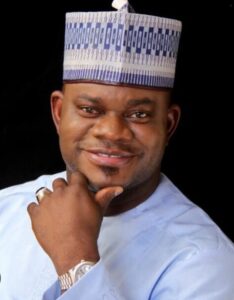
Governor Yahaya Adoza Bello.
For years, the Good people of kogi state,home and in diaspora, have never minced words in their aspiration and yearning for the creation of a state they can call their own, a dream that became a reality over 30 years ago through the sweat of the founding fathers of the state.
Since the birth of the state on August 27,1991,kogites remain avowed in their determination to see that the state they fondly refer to as their “House” stand strong, despite its teething social,economic and political challenges,a reminiscence of general happening in Nigeria, and their reason is not far-fetched.
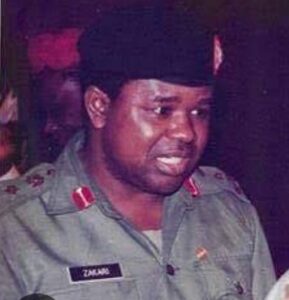
Col.Danladi Zakari.
The first Miliary Administrator of Kogi State.
Kogi State, carved out of the old Benue and Kwara States by the regime of General Ibrahim Bababgida on August 27,1991, has been described at various fora as a state whose birth came at the right time.
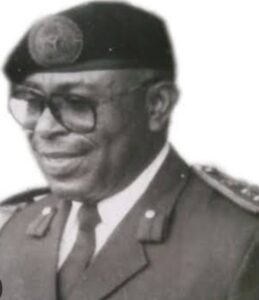
Col.Paul Omeruo.
The second Military Administrator of Kogi State.
Governance commenced in the state on August 28,1991 with Col.Danladi Mohammed Zakari as the the first military administrator,followed by Col.Paul Omeruo, then Col.Bzigu Afakrya and lastly, Col.Augustine Aniebo.
Prince Abubakar Audu was the first democratically elected governor of the state, succeeded by Alhaji Ibrahim Idris who handed over the leadership to Capt. Idris Ichalla Wada and in turn succeeded by Alhaji Yahaya Adoza Bello whose second term in office is expected to end in January,2024.
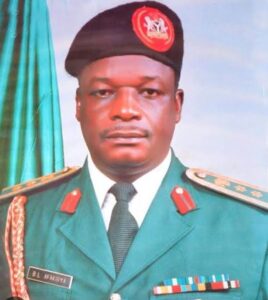
Col.Bzigu Afakrya.
Third Military Administrator of Kogi State.
The yearning for the state of their own is anchored on the remarkable but hidden potentialities of the area which if effectively tapped will mark it out as one of economic hubs and lifewire of Northern Nigeria, according to Profesdor Olayemi Akinwumi.
Made up of several ethnic and linguistic groups such as IgalaeEgbira, Okun and others, kogi is endowed with iron ore, tantalite, limestone,coal, petroleum among which if well effectively harnessed, will shoot the state into national and international limelight.
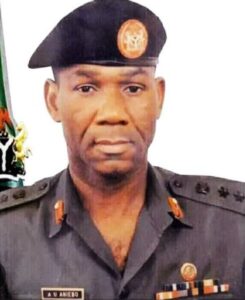
Col.Augustine Aniebo.
The last Military Administrator of Kogi State.
Cultural enthusiasts also believe rich culture and tradition of the kogi state can hardly be eclipsed by any other culture in Nigeria and beyond the shores of the country.
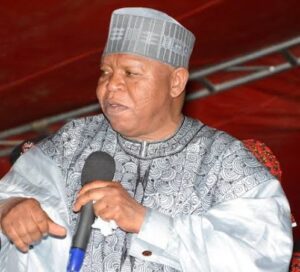
Prince Abubakar Audu.
The first democratically elected Governor of Kogi State.
Wikipedia adds that the creation of the state is a dream fulfilled and one which seeks to put the State on the threshold of rapid socio-economic transformation.
This, no doubt, is in consonance with the dream of the founding fathers of the state, the sixth of its type created in north central Nigeria in the 90s.
Kogi State occupies 29,833 square kilometers and it is the most centrally located of all the states of the federation, share a boundary with about 10 states of the federation, and peopled with various ethnic nationalities living peacefully with one another.
Apart from being a state, some citizens prefer to call kogi, figuratively, a “House,” people with different ethnic nationalities, whose varied political interests, shake the corporate standings of the “House.”
Addressing the people of the state in his broadcast to mark the 32nd of the state, the Governor, Alhaji Yahaya Bello, noted that “Kogi State “emerged as an entity from parts of Benue, Niger, and Kwara States, full of the promise and possibility of a new era for our people.”
He is, however, not unmindful of the power of collective responsibility propelling the process of meaningful development of the state and the attainment of such lofty heights since its creation in 1991.
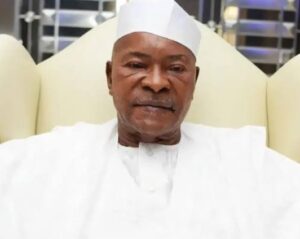
Alhaji Ibrahim Idris.
The second democratically elected Governor of Kogi State.
He reminded the citizens of the state that “any success we have seen as a state, since we became one of the federating units in the Federal Republic of Nigeria is not the work of a single individual or administration, but the collective effort of every Kogite.”
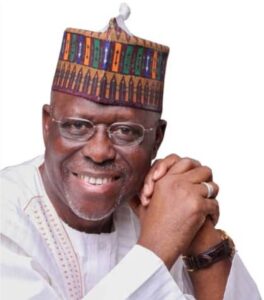
Capt. Idris Ichalla Wada.
Commenting on the socio-economic and political relevance of Kogi State in the political equation of Nigeria at a public function in Lokoja, Alhaji Suleiman Baba Ali,
Ga’abi of Lokoja & Mutawallen Arewa of Nupe, also confirmed that Kogi state is blessed with lots of human, natural, and mineral resources, too numerous to mention. He was represented at the event by Alhaji Adama Yahaya, former manager of Kogi United FC of Lokoja.
Above all, he added, “Kogi State, being a Confluence State of opportunities plays host to strategic socio-economic national and local assets such as Ajaokuta Steel Company, the Obajana or Dangote Cement Company amongst several others.
What’s more, its citizens are some of the highly educated Nigerians, home and abroad.
This according to him is coupled with historical and tourism monuments and sites in Lokoja, Idah, Okene, and indeed, in almost all the 21 LGAs in Kogi State.
However, political analysts believe that despite the social, economic, and political development of the state, various political interest groups threaten the soul of this enviable entity figuratively called “House” and stress the need to check the negative development before it blows out of proportion. The urgency of ensuring the political stability of the state becomes much more imperative as November 11, 2023, gathers steam.
Speaking as the Chairman, 2023
edition of the Nigerian Post annual lecture and award ceremony, with the theme, “Kogi@32: Sustaining Unity, Peace of The Confluence, This House Must Not Fall,” Baba Ali described the topic as apt but called for sober reflections.
He said as someone who knew the struggle that went into the creation of the State by the patriotic statesmen from the East, West, and the Central senatorial districts of the State, “There is every cause for us to celebrate and nurture this over 30 years old and growing State of ours.”
He was, however, quick to warn that the dint of hard work and consistency in making sure that Kogi State, now 32 years old, by successive administrations in the state; military or civilian, must not die in the quest by political actors seeking for leadership position.

Capt.Idris Ichalla Wada.
The third democratically elected Governor of Kogi State.
“In all of these, what we have as a major asset is our peaceful disposition to one another, irrespective of ethnic, religious or political affinity and affiliation. We are one Kogi State and we will always remain so by the grace of God!”, he said.
According to him, the several political interest groups fighting for the control of the soul of the State are simply expressing their underlying interests which may or may not represent the general interest of all the people of the state.
“For me, and indeed, for most of us who are determined and committed to building our common heritage, there is no better time than now to renew our hopes in moving Kogi State forward through concerted effort.
He called on the people to work beyond physical boundaries and look more at the bigger picture of a Kogi State that would be a confluence of opportunities, when properly harnessed,” and can cater for all our needs, be they basic or otherwise.”
The chairman of the occasion noted that Kogi state is blessed with all the resources required to build a virile State that would be prosperous and can accommodate all genuine aspirations of its citizens.
He expressed optimism that when such an attitude is adopted, it would pave the way for the emergence of “an egalitarian State where all of us can and should be equal partners and be seen to be committed to making sure that the sacrifices of our heroes past are not in vain.
“As we approach the 2023 Kogi State Governorship Election, it is my candid opinion that capacity, competence, and the unity of our heterogeneous State should be the watchword and not ethnicity, religious or political consideration that would do us no good.
“Let our choice be Kogi first above all other considerations,” he urged the political actors and the people.
Toeing the line of the chairman of the occasion, the guest speaker, who is also the Vice Chancellor, Federal University, Lokoja, Professor Olayemi Akinwumi, observed that the opportunities that abound in Kogi state notwithstanding, there were major problems requiring the attention of critical stakeholders- state and non-state actors- to find a lasting solution to.
He identified such problems as development planning, security, and harmonious co-existence.
Represented by Professor Abdullahi Musa Yusuf, Akinwumi called on the state government to put more efforts into its development plan programs and harp on the “sustainability question” to enable the state to re-evaluate its past, assess its current resources, opportunities, and encumbrances and chart a future to sustainable development agenda.
He said, ” As a state, we must make conscious efforts to harness and maximize our environmental opportunities and resources, and government must provide the required leadership.
“Other issues that a good development plan should capture include the attraction of massive foreign direct investments in the direction of our commercially viable natural resources and the building of massive infrastructure covering education, health, electricity, roads among others,” the VC further urged.
On security, Prof. Akinwumi said that if the state would survive, the government must continue to invest in the security of lives, property, and all sources of livelihood.
The guest speaker, who commended the Neighbourhood Watch of the state government, called for its sustenance, adding that the role of critical stakeholders- government, traditional rulers, religious leaders, community associations, and security services- must be recognized and funded.
He stressed the importance of the role of security services in intelligence gathering, calling attention to early warning signals and red flags and promoting the idea of good neighborliness in security management.
On harmonious co-existence, the erudite Professor of History, who described the kogi state as a home to many ethnic groups and cultures, argued that while kogites must recognize their centrifugal and centripetal forces, they must promote the centripetal or uniting forces that bind the state together.
“There must be a deliberate synergy by all to enhance the well-being and development of the state,” he said.
He further called on the people of the state to play down their political differences by looking at kogi as a common project that must be guided, nurtured, and sustained to the envy of all.
Governor Yahaya Bello, represented by the Commissioner for Education, Science, and Technology, Mr.Wemi Jone, said the principle of his administration is based on justice, unity, equity, and fairness in siting projects in the three senatorial districts of the state.
According to Bello, the current government under his watch also makes sure that the appointment of management of educational, health, and other establishments is based on fairness, equity, and justice to ensure peace in the state.
He cited that where an appointee of the state government from one senatorial district is made the overall head of the. state-owned institution, the government makes sure that the deputy comes from another district in such a way that no district would feel marginalized.
This style of his administration, the governor said, helped in no small measure to ensure peace in the state and hoped that such positive development would continue even after his tenure.
In all, it is instructive to note that the government and the people of the state have what it takes not to allow the “House” called Kogi to fall.
The import of this is that kogite must fly kite of unity of the state, irrespective of differences in religion, ethnicity, culture, and tradition, and must have it as a cardinal responsibility to display avowed patriotism towards peace and development of the state, more so as the governorship election in the state gathers momentum.
The consensus opinion among most people who attended the the Nigerian Post lecture has been that political gladiators and their followers would do the state good by playing the game of politics according to the rule for peace and development to reign supreme so that “This House called kogi, will not fall.”
Like Sunny Okosun of the blessed memory once sang in one of his evergreen songs,” Together we shall win forever, forever we shall win together” but as one indivisible entity.
For this to be a reality in the quest for the attainment of a peaceful state, every kogite must shelve his or her divisive expressions and stick to those developments that unite the state.
The journalists and security agencies also have a stake in ensuring that the House does not fall by adhering strictly to the ethics of their profession shunning escalating fake news and enhancing efforts in ensuring the security of life and property respectively.
By the same token, parents must be up to their responsibility by keeping an eagle’s eye on the conduct of their children, to prevent them from falling prey to the lure of some politicians ready to use them to settle scores with perceived political enemies, especially during contests.
When we do this, in unison and with sincerity of purpose, we will have made the founding fathers of the state, dead or alive, feel that their labor for the creation of the state is not and will never be in vain.
This is necessary so that the Kogi, the “House”, built on a solid rock by its founding fathers, provides an enviable social, economic, and political platform for its citizens to be proud of and make it a shining example for other states in Nigeria does, must not and should not fall.
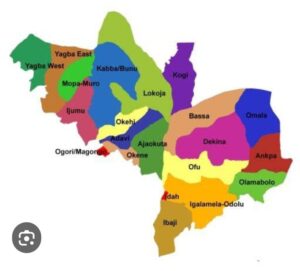
At the national level national level, it is instructive to note that though comparatively young as a geo-political expression in Nigeria, Kogi state remains a crucial entity to the political equation of Nigeria; as the gateway between the northern and southern parts of the country, among other social and economic importance.
Dada Ahmed publishes The Reporters.


